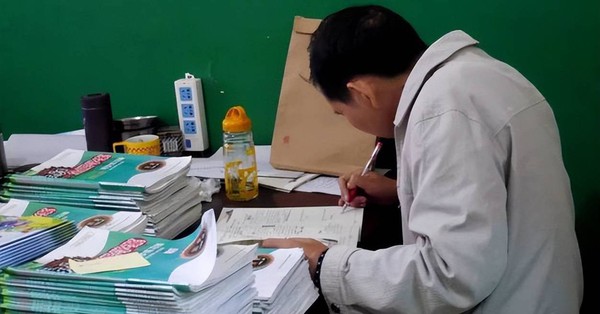How do parents and schools affect a child’s development?
In developed countries, schools play a decisive role in the success or failure of children, in contrast to developing countries, parents often leave a strong mark.
Dao Minh Hong – Vice Dean of the Faculty of International Relations of the University of Economics and Finance (UEF) shared the above information at the seminar SACE Journey – Unlocking Gen Z, episode 1, which was broadcast on March 22 on VnExpress.
In fact, there have been many surveys and research studies in the field of education that have tried to find the answer “how schools play a role in determining the success or failure of a child”. In the US, in the 2010s – when the homeschooling model was in vogue, experts surveyed the reasons for not choosing to study in school, the psychology of children when they did not go to school. … The results showed that there were differences in learning outcomes, communication skills and social integration skills between children who study at home and those who attend school. The role of schools in children’s growth also varies between developing and developed countries.
Western modern education has experienced a historical journey since the 16th and 17th centuries with a humanistic educational philosophy, then the Enlightenment (18) century with Enlightenment education. Through the 19th century was the educational philosophy of Wilhelm von Humboldt “- a combination of objective science with subjective education, taking science and culture as educational content with the aim of harmonious development of all talents in the child; training the child’s abilities not only on some educational topics but in all aspect.
After so long the philosophy of education has been supplemented and changed according to changes in production, economic, political and social life, Western education has proven that schools play a decisive role for the success of a child’s developmental life. And that’s when the Law on Compulsory Education (compulsory schooling for all children) was enacted, making it universal in the world.
At school, children are free to express themselves without worry and fear of the care and attention of their parents. At the same time, children receive great encouragement from teachers (educators) with the principle of education so that children develop independently, organize themselves to live happily in space with people who do not have to be blood relatives. Thus, the role of parents fades in independent learning, self-discovery and self-existence of children in the school environment.

Dr. Dao Minh Hong shared about the role of schools and parents in a child’s development. Photo: Characters provided.
But in developing countries the picture is completely different. The Economist magazine cites a survey by the London-based Varkey Foundation Education Fund conducted in December 2017 in 29 countries, including Vietnam, noting that parents in developing countries spend a lot of time. Time helps children learn more than parents in developed countries.
Vietnamese parents spend an average of 10 hours a week helping their children with homework or reading for them, ranking 2 out of 29 countries surveyed, just behind India. That fact contrasts with parents in developed countries such as Finland and Japan. They only spend an average of 3 hours per week helping their children learn. Only 5% of Finns help their children with homework at least 7 hours a week, while 31% do nothing.
“I remember in the 2017 period, Vietnamese people were proud of these results. Vietnamese people feel proud to spend more time studying with their children than any other country. But that’s when I realized there is a problem in comparison. Results with developed countries – Vietnamese parents have interfered too deeply in learning, too worried, too protective, always taking their children’s learning as their own”, said Dr. Dao Minh Hong. “It makes children lose self-discipline and independence in the journey of maturity; freedom to explore to find the principle of existence for himself. Thus, children get pressure from their own parents. I”.
He also agrees with Associate Professor Nguyen Hoang Anh’s point of view, “Vietnamese parents are a barrier to education”.
“Parents can read a lot and understand information, but that doesn’t mean they are experts and knowledgeable people with all educational issues. Vietnamese parents are often subjective, telling themselves about education and from there interfere too deeply in parenting. child,” said dr.
On the other hand, Vietnamese parents have always seen schools as a place to provide educational services, but did not see this as an important environment for their children to develop into adults. Most parents also think that their children study too much, too hard, but they don’t know that Vietnamese students study very leisurely compared to other countries in the world. Especially Vietnamese students have a big problem with study skills, knowledge acquisition skills to form their personal knowledge. Usually, Vietnamese students read too little – across all subjects, they only need to read one textbook to pass the subject and pass.
“If parents have the ability to receive information on their own, to be aware of the outside world, then compare it with the curriculum of developed countries to study with their children, helping them to have study skills and self-study. His actions are taking care of children, not fully entrusting the affairs of educating children to school, then blaming the school,” said Dr Hong.
According to him, being a parent in today’s era is not easy, raising children is a lifelong career. And it can’t be ignored, so you have to study, read, study, and upgrade yourself to be able to carry out that role well.
Doctors mentioned that she used to be, like many 7x, 8x parents, lacking the awareness and skills as a mother on the journey of growing up with her children. She also used to be confident and proud when she interfered in her children’s studies, then at school. But then he found the result was not what he wanted, and the boy became even more confused. “So I was wrong, wrong in both ways of coordinating with the school. When I am enlightened about how to accompany my child, when I clearly identify my child as my friend in life at home and at school… that’s when I lost the pressure of motherhood and the pressure of the child in front of parents also disappeared”, said Dr. Hong.
And
Seminar series The SACE Journey – A journey to the world’s top universities from grade 10 is within the framework of Education Connect – an educational connection portal hosted by the online newspaper VnExpress and the Scotch AGS International School of Monolingualism. Experts will cover educational topics to assess the challenges of Gen Z parents while accompanying their children, and share orientation views for high school students.
Scotch College Adelaide – an international education system with more than 100 years of development in Australia, comes to Vietnam, starting with the launch of the Scotch AGS Monolingual International School from grades 1 to 12, standardized from the curriculum. Australian National Education (ACARA) , accepts the Australian Baccalaureate – SACE, with international validity.
Readers register to attend here.
at Blogtuan.info – Source: vnexpress.net – Read the original article here



